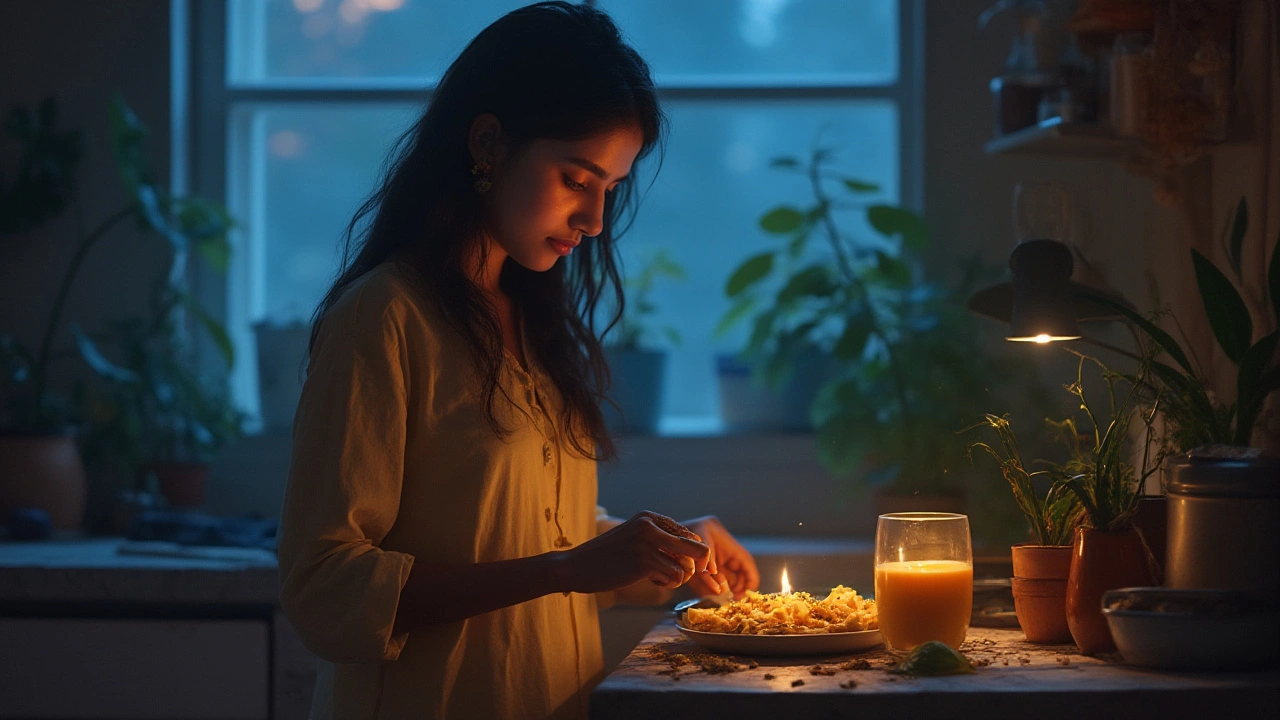Ever find yourself tiptoeing to the kitchen at 11:45 p.m., hungry but not sure what won't wreck your stomach or haunt your dreams? You're in good company. Most of us crave something to nibble before bed, but eating the wrong thing can leave you tossing and turning. The real trick is knowing which snacks are easy on the stomach, especially when your body is winding down. And let’s be honest—nobody enjoys feeling weighed down or bloated when all you want is a quick bite before sleep. Believe it or not, some classic comfort foods can cause late-night chaos for your gut, but there are also plenty of options that are both satisfying and gentle. Let’s take a deep dive into how to snack smart, the best foods to choose, sneaky troublemakers to avoid, and how to actually enjoy a late-night treat that won’t leave you regretting it in the morning.
Why Your Late Night Snack Matters
When bedtime rolls around, your digestive system slows down just like the rest of you. That means foods that are tough to digest can linger, leading to bloating, heartburn, or even ruined sleep. Eating heavy, greasy, or spicy foods right before hitting the pillow is a recipe for disaster if you want to sleep well and wake up refreshed. Your metabolism isn’t working overtime at night, so the calories you eat aren't burned off as easily either. On the bright side, eating the right snack can actually help keep your blood sugar steady, curb hunger pangs that might otherwise drag you out of bed, and even improve sleep quality thanks to certain nutrients.
If you've ever read about melatonin or serotonin, you know they're closely tied to sleep and mood. Some nighttime snacks can actually help your body produce more of these hormones naturally. For example, magnesium, found in nuts and seeds, supports muscle relaxation and better sleep. Complex carbohydrates, like whole grain toast, help with serotonin production, which promotes relaxation. The trick is to skip the stuff that's heavy, greasy, or high in sugar and go for snacks that are light, simple, and have a balance of nutrients. A recent study published in the "Journal of Clinical Sleep Medicine" showed people who ate lighter, lower-calorie snacks before bed actually slept better compared to those who went to bed hungry or snacked on junk food.
One interesting fact: eating protein-rich foods like a boiled egg or Greek yogurt before bed can help calm nighttime hunger without upsetting your stomach. These options take longer to digest than simple carbs but don’t overload your gut. Pair them with something mild, like a banana or unsweetened applesauce, and you’ve got a snack that’s easy to digest and won’t derail your sleep. So, the next time you’re peering into the fridge late at night, aim for snacks that are familiar but gentle, easy to prepare, and make you feel good—not stuffed.
Top Easy-on-the-Stomach Snacks for Late Night
You don’t have to give up tasty snacks just because you want to be kind to your gut. There’s actually a pretty wide menu of late-night treats that hit the spot without giving your stomach an unwanted workout. Here’s what makes them shine: they’re simple, lightly processed, low in fat, and easy to digest. Think fresh over fried! Ready to build your snack stash?
- Bananas – Soft, lightly sweet and packed with potassium, bananas are gentle on the stomach. The fiber in bananas helps support digestion without being harsh, and their slow-release sugars won’t spike your blood sugar in the middle of the night.
- Oatmeal – Cook a small bowl with water or plant-based milk for a warm, soothing treat. Oats are full of soluble fiber, which helps settle the stomach. Avoid loading up with sugar; a dash of cinnamon or a handful of blueberries is all you need.
- Plain Greek Yogurt – High in protein, low in sugar (check the label), and creamy, Greek yogurt is perfect when you want something filling but not heavy. It also provides probiotics, which support gut health.
- Rice Cakes with Nut Butter – Simple rice cakes topped with a thin layer of almond or peanut butter are crunchy, satisfying, and won’t cause you stomach drama. Just stick to one or two; more is not always better late at night.
- Baked Apple Slices – Slice an apple, sprinkle with cinnamon, and bake until tender. Apples are gentle on digestion and make your kitchen smell amazing without any heavy fats involved.
- Steamed Moong Dal – For those who like a savory Indian touch, warm moong dal is light but has enough protein to keep you satisfied overnight. Moong is known for being easy to digest, especially compared to other lentils.
- Crackers and Cottage Cheese – Choose plain, low-sodium crackers paired with cottage cheese for a mix that’s filling and offers slow-digesting proteins. Just avoid flavored or overly salty versions.
- Chamomile Tea with Honey – Okay, it’s mostly a drink, but chamomile relaxes your digestive system and can help you drift off to sleep. Add a dab of honey for comfort without sharp sugar spikes.
If you’re the type who loves mini meals, try mixing and matching—maybe a banana with a spoonful of Greek yogurt or a couple of whole wheat crackers with light dal. The key is to avoid going overboard. Your body can’t fix poor choices overnight, but it sure knows how to reward you when you stick to gentle, simple foods. A great trick: keep portions small (think half a cup or one small piece of fruit) and finish your snack at least 30 minutes before hitting the bed.
Another good tip? If you find dairy tricky to digest, try switching to lactose-free milk or yogurt, or just reach for fruit and nut snacks instead. And while it might sound tempting to end the night with leftovers from dinner, resist anything fried, rich, or creamy—they’ll only slow you down while you’re trying to fall asleep.

Foods to Avoid for Better Sleep (and a Happier Stomach)
This is the part most of us struggle with. Sometimes the foods that seem like obvious comfort, like leftover pizza, spicy samosas, or a slice of chocolate cake, are exactly what will leave you wide awake—not to mention uncomfortable. Spicy foods can cause acid reflux or heartburn, especially if you lie down soon after eating. High-fat snacks (think chips, cheesy dips, rich desserts) take much longer to digest, hanging around in your system and making you feel heavy or even nauseous overnight.
Sometimes the “healthy” snacks are the ones that actually cause the most trouble. Raw veggies like carrots and broccoli are full of fiber but also a challenge for your system to break down when you’re at rest. Beans, certain lentils, and cruciferous vegetables can lead to bloating or gas. Instead, stick with softer, cooked options in small portions. Leftover curries, heavily spiced street food, and anything with onions or garlic are notorious for disrupting sleep and causing stomach upset.
Watch out for sugar, too. High-sugar snacks can create a burst of energy just when you’re trying to wind down. Sometimes it’s hidden—even in snack bars labeled as “natural” or “light.” Multiple studies have linked late-night sugar consumption to poor sleep quality, not to mention the blood sugar crash that can wake you up at 3 a.m., heart pounding with anxiety.
Processed meats, such as salami or sausages, and deep-fried snacks (pakora, fries) are also best left for earlier in the day. These can trigger indigestion and are loaded with salt, which may make you thirsty overnight, waking you for an unwanted water run. Carbonated and caffeinated drinks? Skip them. The fizz in sodas actually makes bloating worse, and caffeine hangs around in your system much longer than you think, keeping your brain buzzing well past bedtime.
If you’re sensitive to lactose, even a glass of milk can sometimes mean stomach pain or extra trips to the bathroom. If you notice trouble after eating a certain snack, try an “elimination experiment”—take it out of your late-night lineup for a week or two and see if your sleep or digestion improves.
Tips for Creating Your Own Comforting Late-Night Snack Rituals
Snacking before bed doesn’t have to mean mindlessly munching whatever’s in sight. It’s actually a great opportunity to build a relaxing, gentle ritual that signals the end of the day—and gives your stomach a break. Start by planning ahead: keep easy-to-digest fruit like bananas or apples, single-serve yogurts, or homemade granola handy so you’re not tempted to grab processed junk. If warm drinks help you relax, opt for herbal teas like chamomile, peppermint, or even ginger tea (just go easy on the ginger if you have acid reflux).
Portion control is the secret weapon to keeping late-night snacking healthy. One study out of Stanford’s sleep lab found that people who ate a “half-sized” snack before bed woke up less during the night compared to those who ate a full-sized snack or skipped it altogether. That little bit of nutrition was just enough to stave off hunger without overloading the digestive system.
Your snack shouldn’t be a substitute for dinner—if you’re always starving at midnight, it might be time to revisit what you’re eating for dinner in the first place. Make sure you aren’t just thirsty, either. Sometimes, mild hunger is actually a disguise for dehydration. A glass of water or a herbal tea could solve the craving before you reach for food.
If you’re trying to develop a gentle bedtime routine, try keeping the lights low while preparing your snack, listening to soft music, or taking a few minutes to breathe deeply as you eat. This helps train your brain and body that late-night snacks aren’t a chaotic habit, but a peaceful way to close up the day.
So next time you get that late-night craving, skip the oily and spicy stuff. Reach for easy-to-digest snacks like a banana, a small bowl of oatmeal, or a bit of yogurt and fruit, and your stomach—and your sleep cycle—will thank you. No guilt, no tossing and turning, just restful sleep and a happy morning. Stick with easy on the stomach snacks and enjoy your midnight munching on your own gentle terms.
